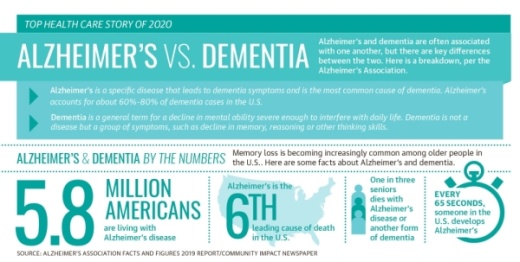Dell Medical School at The University of Texas Austin is looking to do something similar with a focus on memory loss, such as dementia and Alzheimer’s disease, in older people.
“I think something similar [to the Framingham Heart Study] can be done focusing on brain health with the citizens of Georgetown that would have a major contribution to inform science and care,” said Alyssa Aguirre, manager of the Cognitive Disorders Center at the Mulva Clinic for the Neurosciences at Dell Medical School.
Aguirre said the study would be a long-term research project that would help identify risk factors associated with memory loss and dementia.
The study, which would be conducted and partially funded through the Mulva Clinic for the Neurosciences at Dell Medical School, is still in the planning stages, and it could be years before it is designed and set into motion, Aguirre said. But like the Framingham study, this would likely be a multiyear cohort project—one which Aguirre said could change the face of medicine.
“Our hope is to help prevent and detect and treat the risk factors associated with memory loss and dementia in their earliest stages so that we can come up with treatment options and hopefully find a cure one day for dementia,” Aguirre said.
Aguirre said Georgetown was specifically identified as a potential site for this cohort study because of the large number of people in the age category needed for the research, as well as because of the high interest of Sun City and Georgetown residents in research and in contributing to something as important as finding a cure for dementia.
Dell Medical School held a town hall in September to gauge interest and plans to hold a second event Jan. 31 to provide more information about the potential study and the results of surveys taken.
“One of the most common misconceptions is that memory loss is a normal part of aging,” Aguirre said. “Dementia is not a normal part of aging, and with early intervention and early detection, there are things that can be done.”
Learn more about the study Jan. 31 at the Georgetown Health Foundation community room, 2425 Williams Drive, Ste. 101, Georgetown. Free. 1-2:30 p.m.





